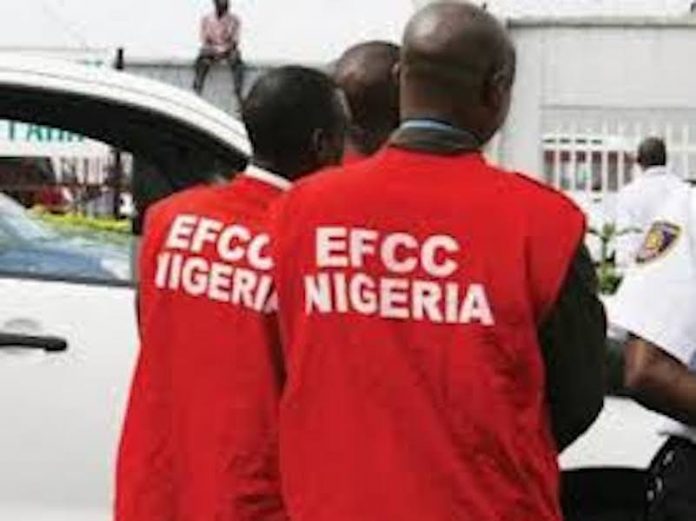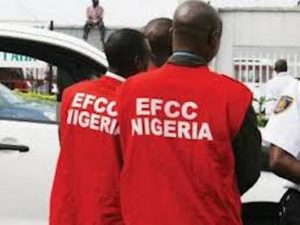EFCC operatives
By Our Reporter
Princess Kama and Onny Igbokwe have been discharged and acquitted by the High Court of the Federal Capital Territory, Jabi, Abuja, Wednesday, over alleged forgery and document falsification in respect of a N170million contract fraud.
The defendants were arraigned by the Economic and Financial Crimes Commission (EFCC) before Danlami Senchi, the trial judge, on October 24, 2018.
The charges followed the petition by an Ibadan, Oyo State-based, Information Technology retail firm, Citadel Oracle Concept Limited, and its Managing Director, Benjamin Joseph, accusing the defendants and their allies of hijacking the Federal Inland Revenue Service (FIRS) contract from him in 2012.
Mr Joseph alleged that the defendants and other members of a syndicate forged his company’s board resolution with which they, without his knowledge, opened an Access Bank account into which FIRS paid the N70.3million proceeds of the contract.
Ms Kama and Mr Igbokwe were charged with four counts of conspiracy, making a false board resolution of Citadel Oracle Concept Ltd dated December 14, 2012, “fraudulently or dishonestly” using the board resolution as genuine, forgery of “a document” and using “a forged document” as genuine.
The prosecution led by Jude Obozua called four witnesses to prove their case while the defence called Ms Kama and another witness.
While delivering judgment in the suit on Wednesday, Mr Senchi held that the prosecution failed to prove its case beyond reasonable doubt.
The judge, in dismissing the case, noted that he observed that the allegations leading to the charges arose from the dispute between Mr Joseph and the defendants over the “sharing formula” of the proceeds of the contract.
He noted that Mr Joseph, with various petitions he wrote to various authorities, was only bent on punishing the defendants by his “false allegations.”
Citing section 323 of the Administration of Criminal Justice Act (ACJA), 2015, the judge ordered Mr Joseph to pay N20million compensation to the defendants for allegedly causing their being charged with the alleged offences without justification.
According to the judge, one major reason the charge of falsification of the bank resolution failed was that Mr Joseph, whose testimony as the person his signature was allegedly forged on the document, “blatantly” refused to appear to testify in court.
“The position of the law on the allegation of forgery is that the person whose signature is alleged to have been forged is an indispensable, vital and material witness and the prosecution’s case is fatal without his evidence,” he said.
The judge also disregarded Mr Joseph’s EFCC statement which was admitted as Exhibit 2 on the grounds of his failure to testify in court.
However, the court did not reference the February 2, 2020 proceedings, when Mr Joseph wept in open court, informing the judge how the prosecution had tried to shut him out and pleaded that he be given an opportunity to state his case.
But despite the gaps left in the case by the prosecution, the judge did not censure the prosecuting counsel, Mr Obozua, but rather sympathised with him over “the frustration” he “passed through especially with the non-cooperation of the nominal complainant towards the prosecution of this case


